|
|
|
Sort Order |
|
|
|
Items / Page
|
|
|
|
|
|
|
| Srl | Item |
| 1 |
ID:
124878
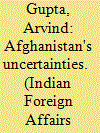

|
|
|
|
|
| Publication |
2013.
|
| Summary/Abstract |
What happens in Afghanistan post 2014 is uncertain. The situation being highly dynamic, it is difficult to make accurate forecasts. Most forecasts are gloomy, and predict political instability, a worsening security situation, a weak economy and violence. However, this pessimistic scenario need not materialise if post 2014 security mechanisms, economic assistance, and a stable political system are put in place. The outcome of the presidential elections on 5th April 2014, the nature of security uncertainties after 2014, and the success or failure of Karzai's efforts at reconciliation with Taliban would influence the situation post 2014.
|
|
|
|
|
|
|
|
|
|
|
|
|
|
|
|
| 2 |
ID:
124882
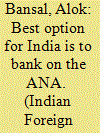

|
|
|
|
|
| Publication |
2013.
|
| Summary/Abstract |
Many analysts perceive that India should evolve a joint strategy with the Central Asian States to counter both the Taliban and Pakistani influence in Kabul. However, this has the grave disadvantage of being perceived as anti-Pakhtoon in Afghanistan's fractured ethnic mosaic. Similarly, any coalition with Iran is likely to be perceived as anti-Sunni by the dominant sect in Afghanistan. In addition, considering the current state of US-Iran relations, any relationship with Iran has a risk of running afoul of the USA. The best option for India is to bank on the ANA and pro-India politicians in Afghanistan. India must not allow it to be side-lined on Afghanistan as was done in the Turkey and London Conferences. There are many Afghan politicians who are willing to do India's bidding.
|
|
|
|
|
|
|
|
|
|
|
|
|
|
|
|
| 3 |
ID:
124877
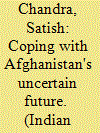

|
|
|
|
|
| Publication |
2013.
|
| Summary/Abstract |
India has, over the last decade or so, been a bit player in Afghanistan, and its influence on political developments there has been marginal. Accordingly, it has been on the fringes of international consultations on Afghanistan. It is not surprising, therefore, that its bitter opposition to talks with the Taliban was ignored. In comparison, Pakistan has been a much more important player and exercised far more influence than India at regional and international fora in the evolution of policies pertaining to Afghanistan. This is partially explicable by Pakistan's extensive border with Afghanistan, age old tribal links, deep rooted linkages with the Taliban, the Haqqani group and Al Qaeda, and a long and tortured history of incessant interference in that country. India's comparative lack of influence is due to the fact that though it has been proactive in bilateral diplomacy vis-à-vis the government of Afghanistan, it has been relatively inactive in reaching out to all shades of opinion in that country, maintaining close contacts with all key external players, and devising innovative and workable strategies for restoring peace and tranquillity in Afghanistan. It is time that India sheds its comparatively reticent posture on Afghanistan and becomes more involved on issues relating to developments there, as otherwise Pakistan will retain its dominant influence, which will obviously work to our detriment.
|
|
|
|
|
|
|
|
|
|
|
|
|
|
|
|
| 4 |
ID:
124881
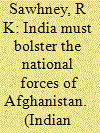

|
|
|
|
|
| Publication |
2013.
|
| Summary/Abstract |
If India has to stay relevant in Afghanistan, it must do all to bolster the national forces of Afghanistan. This can be done by combining India's considerable soft power with that of other regional countries, and pool together diplomatic, political, and military resources with other countries to support Afghanistan's war against disruptive forces. Banking only on things like an UN-mandated international security force or a regional treaty which forswears interference in Afghanistan, is a futile game because it will have no worthwhile mechanism for enforcement.
|
|
|
|
|
|
|
|
|
|
|
|
|
|
|
|
| 5 |
ID:
124879
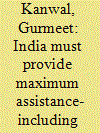

|
|
|
|
|
| Publication |
2013.
|
| Summary/Abstract |
Ensuring that there is peace and stability in Afghanistan is of vital national interest for India. It is a country with which India has traditionally enjoyed warm and friendly relations. Since the overthrow of the Taliban regime in 2001-02, India has contributed immensely to the international reconstruction effort in Afghanistan. It has spent over US $2.0 billion in constructing the Delaram-Zaranj highway, building and running schools and hospitals, and in training the fledgling Afghan administration.
|
|
|
|
|
|
|
|
|
|
|
|
|
|
|
|
| 6 |
ID:
124880
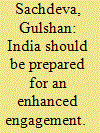

|
|
|
|
|
| Publication |
2013.
|
| Summary/Abstract |
Irrespective of what happens between Afghanistan and the US on bilateral security agreement as well as on the Afghan peace process, it is clear that a new phase in the Afghanistan project is going to begin from 2015. Within this context, most analysts and international reports indicate that, in the post-2014 phase, the country is going to face major challenges in three major areas: security, political and economic. Enhanced Indian engagement in Afghanistan could help the country meet the difficult challenges in all these areas during its decade of transformation (2015?2024).
|
|
|
|
|
|
|
|
|
|
|
|
|
|
|
|
| 7 |
ID:
124884
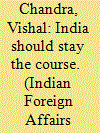

|
|
|
|
|
| Publication |
2013.
|
| Summary/Abstract |
As the Afghan war is far from over, India must take a long-term view of developments in its turbulent north-western neighbourhood. Based on certain assumptions about the likely course of the Afghan war, it is often argued that India may soon have to revisit its policies and priorities in Afghanistan. However, given the constraints and prevailing uncertainty, India may not be in a position to bring about any radical shift in its Afghan policy, at least not in the short-term. The Afghan situation is extremely fragile at the moment in view of the fragmented nature of its polity, overlapping transitions, and strong external dimensions to the conflict, all of which do have a direct impact on India's security and, at the same time, restrict its options.
|
|
|
|
|
|
|
|
|
|
|
|
|
|
|
|
| 8 |
ID:
124883
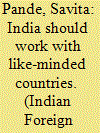

|
|
|
|
|
| Publication |
2013.
|
| Summary/Abstract |
India could reconsider its refusal of arms to the Afghan Army. The caveat here could be that these would be meant for the defence of Afghans only. This could be in the same vein as the assurance Americans have been giving India whenever they supply arms to Pakistan. Extending this logic, India can also station Indian troops around Indian and Indian-built institutions. Just as the USA has said that it would be maintaining a residual force in Afghanistan post-2014, India also can explore similar options in tandem with the USA, while supporting the "gradual, managed force reduction" of US-NATO forces as proposed at the 2012 Chicago summit.
|
|
|
|
|
|
|
|
|
|
|
|
|
|
|
|
| 9 |
ID:
124886
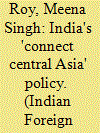

|
|
|
|
|
| Publication |
2013.
|
| Summary/Abstract |
During the past few years, New Delhi has stepped up its engagement with the Central Asian Republics with the aim of building a long term partnership - both bilaterally and collectively under the frame work of newly pronounced 'Connect Central Asia' policy.
The 'Connect Central Asia' policy is based on pro-active political, economic, cultural and people-to-people engagement with the countries of Central Asian region. At present the South, Central and West Asian region is exposed to completely new set of challenges. These new developments make a case for India to evolve a calibrated and co-ordinated response in its engagement with the regional countries to further secure India's core national interests. It is in this context that present article attempts to examine and evaluate various facets of India's 'Connect Central Asia' policy.
|
|
|
|
|
|
|
|
|
|
|
|
|
|
|
|
| 10 |
ID:
124885
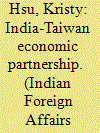

|
|
|
|
|
| Publication |
2013.
|
| Summary/Abstract |
Taiwan, a dynamic democracy and home to the world's leading ICT technology and manufacturing base, is now looking beyond its traditional trading partners and investment destinations, namely China and Southeast Asian countries, towards India as one of its most strategically important economic partner in its revised "Go South" policy for the next decades. As suggested by the new term of IT -- I stands for India and T stands for Taiwan, growing business interests in Taiwan, starting with ICT industry and expanding to other sectors, have driven considerable Taiwanese business delegations visiting India exploring emerging trade and investment opportunities
|
|
|
|
|
|
|
|
|
|
|
|
|
|
|
|
| 11 |
ID:
124887
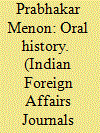

|
|
|
|
|
| Publication |
2013.
|
| Summary/Abstract |
Ambassador Prabhakar Menon served as advisor on foreign affairs to Prime Minister Shri P. V. Narasimha Rao when he was privy, on numerous occasions, to high-level interaction between our Prime Minister and his counterparts around the world. He had also served earlier as Director of the Foreign Secretary's office where again he was an eyewitness to some significant developments. In this conversation with the Journal, he recounts some of the events that shaped India's Foreign Policy postures - as he saw from close quarters (as the proverbial 'fly on the wall') during those two tenures.
|
|
|
|
|
|
|
|
|
|
|
|
|
|
|
|
|
|
|
|
|